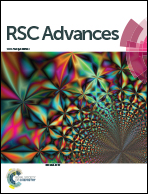Optimizing energy harvesting performance of silicone elastomers by molecular grafting of azobenzene to the macromolecular network
Abstract
The dielectric elastomer generator (DEG) has attracted significant attention in the past decade for harvesting energy from reciprocating mechanical motion owing to its variable capacitance under tension. However, the challenge of conceiving novel DEGs with high energy harvesting performance should be addressed. In this work, azobenzene molecules with strong polarity were synthesized and chemically grafted onto a hydroxyl-terminated polydimethylsiloxane (PDMS) network through a simple one-step process, offering a robust, molecularly homogenous silicone rubber. In addition, dimethyl silicone oil (DMSO) plasticizer was simultaneously added to reduce the mechanical modulus of the composite. The loading content of DMSO was firstly optimized in terms of the mechanical and dielectric properties of the resultant azo-g-PDMS/DMSO elastomers. Then, the effects of azobenzene loading on the morphology, and mechanical, dielectric and electric generation performances were thoroughly investigated. Overall, the dielectric permittivity displayed a rising trend with the increase of the azobenzene content while the breakdown strength increased initially and then decreased. The breakdown strength could reach as high as 73 V μm−1 by grafting with 7 phr of azobenzene while maintaining a relatively low mechanical modulus. Meanwhile, the as-prepared azo-g-PDMS/DMSO films exhibited enhanced energy harvesting density (0.69 mJ cm−3) and electromechanical conversion efficiency (5.01%) at a bias voltage of 1500 V, which were 2 and 2.5 times as much as those of the azobenzene-free matrix. This work provides ideas for future applications of DEG with high energy harvesting performance.



 Please wait while we load your content...
Please wait while we load your content...